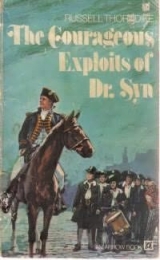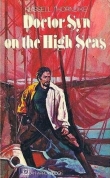
Текст книги "The COURAGEOUS EXPLOITS OF DOCTOR SYN "
Автор книги: Russell Thorndike
Жанр:
Исторические приключения
сообщить о нарушении
Текущая страница: 8 (всего у книги 16 страниц)
7
THE SCARECROW’S EXECUTION
The news spread like wildfire, and lost nothing in the telling. The bare facts of the case were that Admiral
Troubridge, jubilant at finding an opportunity to smash the Scarecrow’s brandy-running from France, had had his
valuable informer snatched from under his nose. One Handgrove, a desperate rascal, who had suffered eleven years’
slavery for treachery against the Scarecrow’s men, had escaped from the secret French harbour where the
contraband was loaded, and had made appointment at the Admiralty to tell all he knew. There was no doubt as to
the reason why he had failed to present himself, for instead of his man, the Admiral received a threatening letter
from the scarecrow, stating that Handgrove’s fate should be a warning to him, and to that ‘meddlesome Parson’,
Doctor Syn of Dymchurch, who had for years been daring enough to attack the crime of smuggling from every
pulpit of Romney Marsh. It was obvious, therefore, that the Scarecrow had retaken his prisoner on the way to
Admiralty House.
By this time the Scarecrow and the doings of his Nightriders had captured the public’s imagination. No longer a
mere local celebrity, his adventures were the chief topic of conversation throughout the inns and taverns of the
London roads, the jokes and jibes of the coffee-houses, as well as the romantic gossips of the fashionable drawingroom. Not a man who did not envy him, neither maid nor mother who did not feel drawn towards his masculine
effrontery. And yet was he masculine? Was he human? Was he not rather the Devil himself? When Doctor Syn
first created the Scarecrow as the leader of the Romney Marsh smugglers, he had striven hard to give him a spiritual
significance, and he was not disappointed in his creation. The Scarecrow was accounted uncanny.
Captain Blain, lodging temporarily at the Vicarage, with his score of sea-dogs billeted in the Tythe barn adjacent,
thought otherwise. Although he had seen the fearful apparition of the Scarecrow, he did not share the superstitions
of his men. He respected the Scarecrow as a dangerous and ingenious enemy whose clever head was joined to an
agile body by a human neck round which he determined to place a hempen collar.
The news of Handgrove’s disappearance came to him in a letter from Admiral Troubridge. The Captain was
given authority to search every house and cottage in the Marsh and ordered to watch the shore, the dykes and the
sluicegates for the body of the missing Handgrove. He was to apply to Admiral Chesham at Dover if he needed
more men, and could inform those immediately under his command that extra pay was scheduled from the
Admiralty, for every encounter with which they might engage the Nightriders of the Marsh. The Admiral also
urged him to work in close cooperation with the Reverend Doctor Syn, whom he described as ‘the bravest
gentleman on Romney Marsh, in that at the risk of his own life he had never ceased to attack the nefarious
smugglers’. He added that in his opinion the only trouble with the vicar of Dymchurch was that he took his
parochial duties too conscientiously. Why could not the fellow find it in his heart to betray what he learned as a
priest under the seal of confession? Not being Roman Catholic the Admiral could not understand why Doctor Syn
was so very scrupulous about keeping secrets heard by him through the confessional comfort of the Church.
To his Bos’n, Captain Blain exclaimed: “Wish the Parson would come back, for I have a suggestion to make to
him. Doctor Pepper tells me that one of his patients is dying. A hard-drinking old rascal of eighty, who seems to be
very afraid of death. A Dymchurch man of that age, and a bad character from all accounts, must know a good deal
about the smugglers. Under the fear of the next world what more easy than for Doctor Syn to make him talk. I shall
try to persuade him that it is for the good of the Marsh parishes. I wonder how long he is staying in London. His
housekeeper says some few days. I only hope old Pepper can keep his patient alive till then. Bos’n, I feel it in my
bones that we can only take the Scarecrow through the help of Doctor Syn. So let us pray for his speedy return.”
Although he did not know it, the Captain’s prayer was answered, for Doctor Syn’s return was certainly speedy.
Once more gratified turnpike keepers opened the road for the generous King’s Messenger, whose magnificent black
horse made short work of the highway. “French spies are on the road,” he whispered, as he paid his toll with a
guinea-piece. “It is not in the interests of the King that any should know I have passed this way. So forget you have
seen a gentleman on a black horse.”
After four and a half hours of hard riding, Doctor Syn turned Gehenna from the road on Lympne Hill, and
descended by a bridle-path to the Marsh Level. He entered his parish by a cross-country gallop, avoiding the village
and making straight for his hidden stables at old Mother Handaway’s hovel. Here he was welcomed by Jimmie
Bone, the Highwayman, who groomed the Scarecrow’s horse, while his master roasted a fat chicken and opened a
bottle of brandy.
“I must not return to the Vicarage,” he said, “till I have crossed the Channel. The lugger, Four Sisters from
London Pool, will lie off Littlestone tomorrow night. Mipps with ten of our London men are bringing her round.
We are unlikely to have any trouble from Captain Blain, since he thinks there is a ‘run’ planned for the next night,
and he will be sparing his men for that encounter, which will not take place. By the way, am I right in thinking that
none of our prisoners in France have ever seen your face?”
“The only ones who have seen me unmasked from Dymchurch,” he replied, “are yourself, the Squire, Mipps and
the Beadle. Why do you ask?”
“Only that I have a strange part for you to play in a somewhat grim adventure,” chuckled Doctor Syn. “I think
that after playing it we shall have no more trouble with our prisoners across the Channel. If Mipps is successful in
carrying out my orders amongst the junk-shops along the quays of London river, we shall teach our enemies a
lesson.”
“But you have not told me what you have done to prevent Handgrove betraying us to the Admiralty,” said the
Highwayman.
“My plan was so simple,” replied Syn, smiling, “that is must have tempted Providence to send It awry. But it
worked, my good James, it worked. I took the rascal from the Admiralty before he had announced himself. He is at
the moment a prisoner in chains below the cargo hatch of the Four Sisters. I will tell you all about it as we eat, and
then I shall get you to sling me a hammock in the empty stall there and let me sleep.”
Across the Channel, in the private harbour from which the Scarecrow’s luggers sailed with their brandy cargoes,
Monsieur Duloge waited anxiously for news from Romney Marsh. From the tower of his chateau above the quay he
could sweep the mouth of the Somme with his spyglass.
He knew that the Scarecrow had returned to England on an enterprise dangerous to them all, and his one thought
since bidding him good-bye was whether his ingenious and brave colleague had succeeded in recapturing their
escaped prisoner, the treacherous Handgrove. If he had failed and Handgrove had succeeded in laying his
information before the Admiralty, at any moment the British Navy might be seen blockading the mouth of t he
Somme. Once it were known that the Scarecrow’s luggers loaded and sailed from his harbour, the brandy trade was
finished as far as he was concerned, and any of his men who escaped with their lives would be fortunate.
Duloge was a rich French gentleman who loved surrounding himself with the expensive luxuries of the time.
The clothes with which he adorned his colossal body, were in the latest mode and cost a fortune. His chateau,
harbour with quay and store -houses, and a fleet of boats, were his own property that had always brought in a
considerable income, but since casting in his lot with the Scarecrow’s organization across the channel, he was
amassing an ever-increasing fortune. There was a large profit for him in every tub that crossed the wa ter, since one
half-anker, weighing when full some fifty-six pounds, and holding four gallons of brandy, could be bought in France
for four shilling a gallon, the same costing in England thirty-six shillings with duty paid. The duty stood at four
shillings a gallon, so that the run of a hundred tubs or half-ankers, was a clear profit of a hundred and twenty
pounds.
Although it had been considered well worth while could one cargo out of three be safely placed, Duloge had
found that since the Scarecrow had managed for him, not one cargo had been lost, though occasionally a decoy boat
carrying a few tubs of inferior spirit was sacrificed for the safety of the cargo proper. The liquor being sometimes as
much as a hundred and eight above proof, was uncolored, and called by the traders white brandy, so that the
smugglers, by mixing it with burnt sugar, could make three full tubs out of one. Enormous profit and well worth the
risk of capture by the Scarecrow for his success, he also had grown to regard him as a friend, and he trembled for his
safety. Ships were scouring the Channel for him. On land, in England, the same search went on relentlessly, for the
reward for his capture mounted as the failure to capture him increased.
Though confident in his colleague’s skill, he had never waited so anxiously for his return. He had his own
anxieties, too. Though the prisoners had worked with a will since the Scarecrow had quelled their mutiny, and a
fleet of luggers were loaded in harbour for the next ‘run,’ he could not fail to notice a growing tension amongst his
prisoners and his armed servants were urged to the greatest vigilance. He knew the cause of the prisoners’ anxiety.
They were sharing with him the same speculation, ‘Had Handgrove reached the Admiralty?’ If the scarecrow had
failed it meant to them a free pardon at home, and a rescue from their slavery by the British Navy. The Scarecrow
had swindled the Government too much. He had defied the King’s ships, and beaten them. Therefore the Navy was
ranged against him,. So with hope in their hearts the prisoners had worked cheerfully in loading the cargoes, hoping
that every tub would fall into the Navy’s hands.
All through the day Duloge watched from his tower. His lackeys for the first time noticed that their master did
not linger over his elaborate meals. He took a mouthful, asked for the next course, and drank his wine hurriedly.
Then back to the tower with his spyglass. As the night wore on he sent for a cloak, ignoring the comfort of his
four-post bed.
“I shall not need my valet. He may retire. I shall watch this night.”
At three in the morning he heard distant gunfire from beyond the river mouth.
At the same time Mipps came to Doctor Syn in the aft cabin of the Four Sisters, and said: “Shot across our
bows, Scarecrow. British Revenue cutter in French waters. She’s no right to tell us to heave-ho.”
“Can you make her out?”
“Aye, it’s light enough to see her lines, though she’s some way off. She’s the Ferret. Should be patrolling
Hastings waters. What’s she doing here?”
“Asking for death. Well, give it her,” replied Syn. “She’s dirty by her name. Give her a dirty end. Sink her.”
“But we can avoid her by out-sailing. And there’s a mist to creep into at the river mouth,” objected Mipps. “And
we have Handgrove aboard,” went on the Sexton. “We have had the luck to get him so far, and we need not risk
failure now.”
“Engage the enemy,” ordered Syn. “We have had luck with us for two days and nights. We have quelled a
mutiny, recaptured a venomous prisoner, and now we’ll play our third card, which will appal our enemies. Sink the
Ferret.”
“But, sir…” faltered Mipps.
Doctor Syn interrupted sharply, “Engage the enemy.”
Mipps went out on deck saying to himself: “Well, when he gets captured, I shall follow him. But if I gets
captured he’ll rescue me. So engage the enemy it is.”
The Four Sisters was a Littlestone boat, and could carry a crew of twenty-five. She was a vessel of good size,
with roomy holds, and had once borne a French name, for she had been a privateer and had been taken by the
Romney Marsh smugglers in a sea fight. She looked smart, was easily handled for speed and could show a quick
stern when chased by anything more powerful in guns, carrying herself only four six-pound carronades.
As the first gun discharge shook the little cabin, Doctor Syn, dressed as the Scarecrow, went on deck to hear
Mipps cry out: “We’ve unstepped her mast at the first shot. No w to bring down her other, and the Ferret will have
on sea-legs.”
“But she still has her teeth,” laughed the Scarecrow, as a broadside fell short of the Four Sisters. “Give her the
rest of the guns below the water-line and then make for the river mouth. Look out.” As he spoke the cutter had
swung round and delivered another broadside. Once more it fell short, though decidedly nearer. The cutter went
about again, but before she could release another broadside the guns of the Four Sisters had struck her below the
water-line.
“If we give her another chance she’ll hit us,” laughed The Scarecrow. “Show her our stern and head for the mist
bank with every stitch we’ve got. The Ferret’s boats are undamaged. There will be no drowning if she sinks.
Cram on the canvas.”
Duloge heard the gunfire and trembled. He calculated that it must be the Scarecrow’s lugger being intercepted
either by British or French patrols.
He would have trembled more had he been able to see the game little Ferret, though holed badly, turn once more
and give chase, to the cheering of her sailors.
The prisoners heard the firing, and gathered it was the British ship sent to rescue them, trying conclusions with
some French man-of-war. But they dared not leave their cottages for fear of being shot down by Duloge’s armed
sentries.
As the dawn stole in they had a pleasant surprise, for they were aroused by a British naval officer attended by two
bluejackets, who ordered all prisoners to dress quickly and to muster on the quay in front of the main store-house.
Within a few minutes of such news a crowd of excited men, women and children were hurrying to the harbour
side.
A strange and glorious sight awaited these poor exiles.
The servants of Monsieur Duloge were roped together on one side of the quay, with their captured muskets
stacked in front of them.
Standing apart, roped and gagged, they saw the elegantly dressed Duloge. His sword had been taken from his
sheath, and lay before him on the cobble-stones. To them his mighty bulk seemed shrunken with dejection. It was
obvious that the British Navy had dealt quickly with him and his sentinels.
Lying in harbour they could see the Four Sisters with the White Ensign flying from her peak, telling them that
the scarecrow’s favorite lugger had been taken at last.
One thing puzzled them. The officer in charge of the King’s men was inspecting a hole in the centre of the
cobbled quay. It was about six foot long and three broad. Two of his sailors were standing shoulder deep in it with
spades.
“She’ll do now, sir,” said one of them.
“Then tumble up, and fall in with the others,” ordered the officer.
The two men obeyed smartly, and joined four of their mates who stood on guard with drawn cutlasses.
Turning to the prisoners the officer said: “You are no doubt glad to see His Majesty’s uniforms for once in you
lives, eh? Well, you may thank your colleague Handgrove for braving escape with information. In a few minutes
you will be given an opportunity to prove your loyalty by obeying an officer of the crown. Six of you who can
handle a musket, and no doubt you all can, step forward. Master-gunner serve them out with the Frenchmen’s
arms.”
While this order was being carried out he called down the quay steps, “Bring up your prisoner, and let us put an
end once and for all with this Scarecrow nonsense.”
Up the steps marched four sailors with drawn cutlasses. They had a prisoner limping in their midst, and at the
sight of him the prisoners who held the muskets cried out, “The Scarecrow!”
“The Scarecrow is taken,” laughed a woman from the back. “We are free! We are free! It is true.”
“Quiet there,” ordered the officer, as he picked up a board that had been lying near the ominous hole in the
ground. He held it up so that all who knew their letters could read.
Those who could repeated the chalk inscription to those who were too ignorant:
HERE LIES A TRAITOR
THE SCARECROW
The guards pushed the prisoner to the edge of the hole which was indeed to be his grave. He was bound and
gagged over his famous mask. Addressing the armed prisoners the officer said, “You will cover him carefully and
when I give the word, fire.”
“Don’t look so fearful now, does he?” laughed one of the armed prisoners. “Ain’t so tall and upright as he was
when bullying us.”
“Poor devil,” muttered Hart, the youngest of them. “I’ve had a bit of the torture they serve out to make men
speak and betray. They’ve no doubt given him a taste of it.”
“Quiet there,” thundered the officer. “Present arms. Stand clear from him. Fire.”
To the cries of hysterical women and frightened children the six muskets cracked. The figure of the Scarecrow
sagged forwards on his knees and toppled into the open grave.
“Pile up those muskets,” ordered the officer. “Ready with your spades, my lads, but first rip off the scarecrow’s
mask.”
The two sailors with the spades jumped into the grave and ripped off the corpse’s gag and mask.
“He’s dead all right, sir,” said one of them.
“Now all of you except the children file past this grave and look at this dead traitor’s face,” said the officer.
“Think, too, whether you were wise or foolish to betray your one-time leader.”
The prisoners in morbid curiosity hurried to the open grave. And then screams of terror broke the silence of the
chill morning. For as they looked down upon the rag-clothed corpse they saw the glazed eyes of their colleague,
Handgrove, looking up at them.
Laughing, the sailors drove them in a herd from the grave at the point of their cutlasses, and then from the quay
steps appeared the figure of the real Scarecrow.
“Fill in the grave and make his epitaph correct,” he ordered.
The officer wrote tow letters more to the writing on the board, and held it out to that they could read the added
word ‘to’.
HERE LIES A TRAITOR
TO
THE SCARECROW
“Let this be a warning to you all,” cried the scarecrow. “These sailors are my men from London. Their uniforms
were purchased by Hellspite from the junk-shops there. Disobey Monsieur Duloge again and there will be other
graves upon this quay.” Then turning to Duloge he added, “Let your men drive them back to their quarters.”
As the wretched prisoners were surrounded by the Frenchmen, who had thrown aside their ropes, they saw the
ensign being struck from the lugger’s peak, and the two spades shovelling in the earth upon the corpse.
No sooner had they gone, however, but the filling of the grave stopped at the Scarecrow’s orders, and the corpse
was lifted out and carried back aboard the lugger.
Then the grave was filled up and the board placed as a headstone. Turning to the play-acting officer the
Scarecrow whispered: “Very well done, my good Jimmie Bone. Admiral Troubridge might have spotted you, but to
the laymen you surely had the manner born.”
In the meantime, back in Dymchurch, Captain Blain’s men searched to no avail for the body of Handgrove. But
two days later they had their reward, for as Doctor Syn was supping with the Captain and describing his coach
journey down form London, Mrs. Fowey, the Vicarage housekeeper, burst into the dining-room with the dreadful
tidings that there was a body hanging from the gibbet outside the Court House.
“It must have got there after dark,” she said, “for as I passed the spot at twilight there was never a smell of a
corpse upon it.”
Rushing out to investigate, Parson and Captain cleared their way through a group of fascinated though fearful
villagers who were reading an inscription nailed to the post.
“THE SCARECROW’S COMPLIMENTS TO CAPTAIN BLAIN. IN FUTURE THE ADMIRALTY SHOULD
GUARD THEIR INFORMERS WITH MORE CARE, FOR DEAD MEN CARRY NO TALES.”
“I’ll get the Scarecrow for this,” cried the Captain.
“Dreadful,” muttered Doctor Syn, shaking his head and shuddering with horror. “Really, something should be
done.”
“Is shall be, Parson,” said the Captain. “Don’t lose heart. We’ll catch the rascal yet.”
“Oh dear, oh dear,” sighed Doctor Syn, “I wonder if you ever can.”








